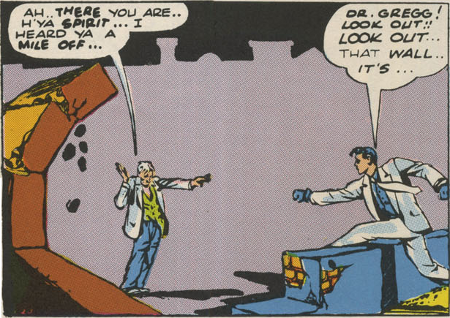Prairie Dogs' Dilemma
Sunday, 26 April 2009I have posted one entry to this 'blog that made reference to Cournot-Nash equilibria, and I expect to write another soon. I'm going to use this entry to explain the concept of a Cournot-Nash equilibrium, without resorting to mathematical formulæ.
First, let me give my favorite example of the idea, the behavior of prairie dog mothers in at least some towns. Prairie dogs are omnivores; they are primarily herbivorous, but will also consume small animals such as insects. If a prairie dog mother stays away from her litter of pups, they are liable to be eaten by something, so she will prefer food that is close at-hand — such as the pups of another mother who is away from her burrow. In fact, in some towns, when pups are eaten, it is usually by mothers trying to get home before their own pups are eaten. If any one prairie dog were to stop eating pups while the others continued, then her own pups would more likely be eaten because she'd be away from home for longer or more frequent periods. They eat each other's babies because they eat each other's babies.
Some of you may be thinking of the Prisoners' Dilemma, which, under classic assumptions, results in a similar mess. It too is an example of a Cournot-Nash equilibrium.
The essence of a Cournot-Nash equilibrium is that each participant has no incentive to change behavior unless other players change behavior, so each — and thus every — participant sticks with his or her established behavior. Although the prairie dog example and the classic telling of the Prisoners' Dilemma are sub-optimal equilibria, it could be the case that an equilibrium were the best-possible equilibrium, and no one had an incentive to change his or her behavior so long as no one else changed his or her behavior; so it's important to distinguish optimal Cournot-Nash equilibria from sub-optimal Cournot-Nash equlibria.
The Nash to whom the name refers is John Forbes Nash jr, whose life and work were grossly misrepresented in the movie A Beautiful Mind (2001). Nash's most famous accomplishment was explicitly generalizing and formalizing the idea of a Cournot-Nash equilibrium, which some simply call a Nash
equilibrium. But there were famous antecedent uses of the idea, the best-known of which was by Antoine Augustin Cournot, in an 1838 model of oligopolistic competition.[1]
A less-often recognized antecedent use was by Thomas Hobbes in Leviathan (1651). Hobbes famously proposes that, in the absence of a State, life will be nasty, brutish, and short
. More specifically, he said
According to Hobbes, without the State, production is subject to predation, so potential producers have less incentive to produce and everyone has incentive to prey upon everyone else.Hereby it is manifest that during the time men live without a common power to keep them all in awe, they are in that condition which is called war; and such a war as is of every man against every man. For war consisteth not in battle only, or the act of fighting, but in a tract of time, wherein the will to contend by battle is sufficiently known: and therefore the notion of time is to be considered in the nature of war, as it is in the nature of weather. For as the nature of foul weather lieth not in a shower or two of rain, but in an inclination thereto of many days together: so the nature of war consisteth not in actual fighting, but in the known disposition thereto during all the time there is no assurance to the contrary. All other time is peace.
Whatsoever therefore is consequent to a time of war, where every man is enemy to every man, the same consequent to the time wherein men live without other security than what their own strength and their own invention shall furnish them withal. In such condition there is no place for industry, because the fruit thereof is uncertain: and consequently no culture of the earth; no navigation, nor use of the commodities that may be imported by sea; no commodious building; no instruments of moving and removing such things as require much force; no knowledge of the face of the earth; no account of time; no arts; no letters; no society; and which is worst of all, continual fear, and danger of violent death; and the life of man, solitary, poor, nasty, brutish, and short.[2]
But Hobbes has also identified a special case of one solution to what would otherwise be a sub-optimal Cournot-Nash equilibrium. In Leviathan, men end the war amongst them by explicitly agreeing to the creätion of an institution (the State) which will change the equilibrium. More generally, agreements need not be explicit or conscious, and the transforming institution could be a code of conduct. For example, the classic statement of the Prisoners' Dilemma treats the game as played in a social vacuum of a sort. In real life, people build reputations, reward desired behaviors, and punish the behaviors to which they object. Commitment mechanisms don't necessarily free us from every possible sub-optimal Cournot-Nash equlibrium, but naïve game theory too often fails to consider their possibility. (There was some perverse gloating in A Beautiful Mind about how Nash had somehow refuted Adam Smith, but the liberal order of which Smith wrote is filled with commitment mechanisms. Private property itself is an example of such a mechanism.)
Perhaps, in time, even the prairie dogs will evolve a mechanism such that eating each other's pups is no longer an equilibrium.
[1] Recherches sur les principes mathématiques de la théorie des richesses, Ch 7.
[2] Chapter XIII ¶ 8-9.


 Buchanan writes
Buchanan writes ![[portrait in chalk by THB]](wp-content/uploads/2009/04/pastelchalk_th.jpg)
